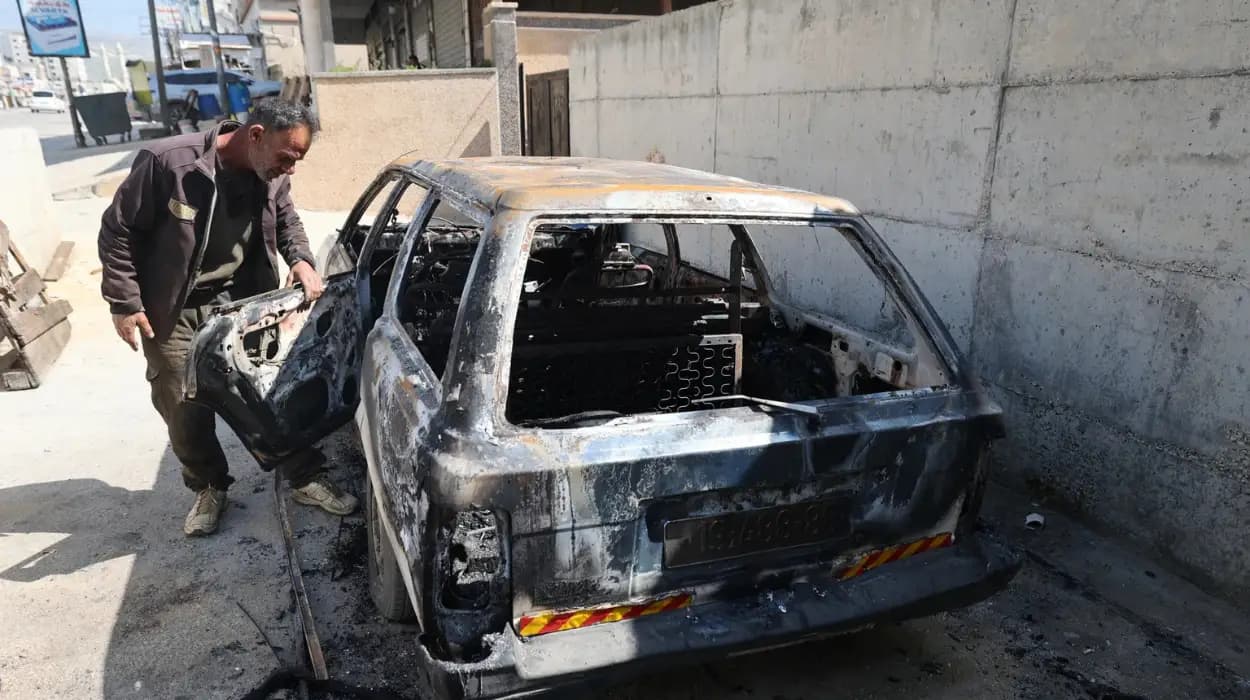Israeli settlers allegedly set fire to multiple vehicles in
Burqa village near Ramallah, prompting strong condemnation from local
Palestinian residents and raising new concerns over escalating settler violence
in the occupied West Bank. The incident comes amid broader regional tensions
and growing international scrutiny over settler activities in Palestinian
territories.
Inverted Pyramid: The Critical Facts First
Multiple media outlets confirmed that Israeli settlers, identified by Palestinian officials and residents as "colonisers," entered Burqa village near Ramallah late Wednesday night, setting fire to several private vehicles belonging to Palestinian families. Witnesses described masked individuals torching the cars before fleeing the scene. The attack left several vehicles charred and residents shaken, as heightened security tensions persist across the West Bank.Attack Details
As reported by Mahmoud Hassan of Al Jazeera,
"a group of Israeli settlers attacked Burqa village at around 2 a.m., torching at least six vehicles and vandalising property belonging to Palestinian families."
Local resident Ahmed Barghouti told Al Jazeera,
“We woke up to the smell of smoke and saw masked settlers running away from our cars, which were already burning. This is a recurring nightmare for our community.”
The incident reportedly unfolded quickly, with settlers
moving in after midnight under the cover of darkness. Surviving vehicles
remained smouldering into the morning as security forces arrived on the scene.
Eyewitness Accounts
According to Fariha Nasser of The Guardian, Burqa resident Samira Othman recounted,
“We heard the noise outside, and by the time we ran out, it was too late. Our family truck was engulfed in flames. We are terrified for our children’s safety.”
Context of Tensions
As analysed by Tom Bateman for BBC News, the attack is seen as part of a persistent and rising trend of settler violence against Palestinians amid longstanding land disputes in the West Bank. Bateman notes,
“Over the last year, the West Bank has seen a surge in settler attacks, with Palestinian communities reporting near-daily incursions, arson attacks, and intimidation tactics.”
Statements from Local Authorities
The Palestinian Authority (PA) condemned the attack, with Spokesman Nabil Abu Rudeineh quoted by Reuters as saying,
“These acts are meant to terrorise our people and pressure them to leave their land. We demand urgent international intervention to protect Palestinian lives and property.”
Israeli police confirmed they had dispatched units to
investigate the incident but gave no immediate comment on the identity of the
perpetrators. As reported by Reuters’ Dan Williams, the Israeli military stated
it was "reviewing evidence collected at the scene" and would
apprehend any suspects found responsible.
Immediate Impact
Reporting for Al Jazeera, Mahmoud Hassan observed,
“The attack has left families displaced and at a loss, as they rely on their cars for daily transportation, work, and school commutes. Now, fear has replaced routine, with children and parents alike traumatised by the violence.”
Local resident Mahmoud Barakat lamented to The Guardian's Fariha Nasser,
“Our sense of safety is shattered. We want peace and to be left alone, but attacks like this make us fear for tomorrow.”
Surging Incidents
According to The New York Times journalist Isabel Kershner,
“Attacks by Israeli settlers on Palestinian villages have sharply increased since 2023, particularly following regional escalations. Rights groups have documented hundreds of arson attacks, property damage, and assaults, mainly in outlying rural communities.”
A recent report from Human Rights Watch cited by The Guardian notes:
“Settler violence remains largely unpunished, as Palestinian complaints rarely lead to meaningful investigations or convictions by Israeli authorities.”
Israeli Authorities' Response
As reported by Amir Bohbot for Ynet News, Israeli Defence Minister Yoav Gallant urged calm, stating,
“Israel will not tolerate vigilantism or private violence. All incidents will be investigated, and security measures will be reviewed to prevent further escalation.”
What Statements Did Local and International Figures Make?
- Mahmoud
Hassan (Al Jazeera): “Palestinian leaders have called for a
UN-led investigation into a string of recent attacks on villages like
Burqa.”
- Nabil
Abu Rudeineh (PA Spokesman, Reuters): “This is state-backed
aggression.”
- Amnesty
International Statement (cited by The Guardian): “Impunity for
settler violence is unlawful and must end. Authorities must ensure
protection for all civilians.”
- IDF
Statement (as reported by Amir Bohbot, Ynet): “We are actively
investigating the incident and will apply the full force of the law to
future attacks.”
Ongoing Fear and Community Solidarity
Residents expressed a determination to remain in Burqa despite the risks. According to Fariha Nasser (The Guardian), local teacher Layla Marzouk said,
“We will support one another and rebuild, but what we need most is protection from these attacks.”
Youth groups and volunteers began clean-up and fundraising
efforts soon after the attack, aiming to help those whose property was
destroyed.
Rising Tensions and Diplomatic Fallout
Tom Bateman of BBC News concludes,
“Incidents like the Burqa arson attack are contributing to a broader climate of tension and instability in the region. Diplomatic channels have urged restraint on all sides, but residents on the ground see little change.”
The arson attack in Burqa village marks another chapter in
the ongoing struggle between Israeli settlers and Palestinian communities in
the West Bank. As highlighted by on-the-ground reporting from Al Jazeera,
Reuters, The Guardian, BBC News, and other outlets, the incident underscores a
worrying surge in settler violence amid a broader context of tension and
uncertainty. Official responses vary in tone, but the shared message among
affected residents is clear: much more needs to be done to ensure safety,
accountability, and the rule of law for all communities in the region.
